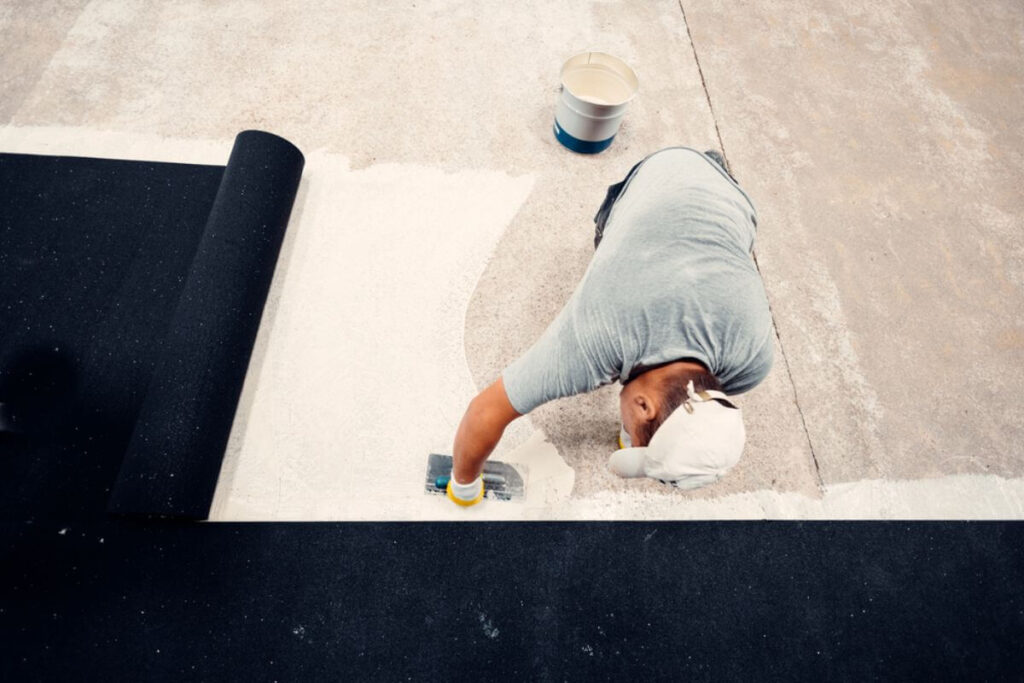Overview
- Waterproofing floors protect against moisture, mold, and structural damage, ensuring durability and longevity.
- Costs vary based on materials, application methods, and location.
- Popular solutions include epoxy, polyurethane, vinyl, and cementitious coatings.
- Understanding how much waterproofing floors cost helps in choosing the right option for long-term savings and protection.
Waterproofing floors involves applying solutions that prevent moisture damage, mold growth, and structural deterioration. This process helps maintain a clean and dry environment, preserves the floor’s appearance, and enhances its longevity, especially in moisture-prone areas.
Understanding the cost of waterproofing floors is essential when planning a durable and long-lasting flooring solution. This article explores how much waterproofing floors.
Waterproofing Floor Options in the Philippines and Cost Factors
In the Philippines, waterproofing floors are widely available, with solutions designed to withstand the country’s tropical climate and frequent rainfall. These include sealants, coatings, and membranes, each serving as an investment in protecting flooring from moisture-related damage.
Several factors influence the cost of waterproofing solutions:
- Material Type: Different materials come with varying costs, durability, and effectiveness.
- Floor Area Size: Larger spaces require more materials and labor, increasing overall costs.
- Surface Condition: Damaged or uneven surfaces need additional preparation, raising expenses.
- Application Method: Manual or spray-applied methods impact labor intensity and equipment use.
- Location: Material availability and labor rates vary by region, affecting pricing.
Types of Waterproofing Solutions
Waterproofing floors protects against moisture, enhances durability, and preserves structural integrity. The best method depends on surface type, environment, and budget. Here are effective solutions.
Epoxy Coatings
Epoxy coatings are protective layers made from resin and hardeners, forming a strong, durable surface. These coatings create an impermeable barrier that prevents moisture from seeping through, reducing water damage and mold risks. Additionally, their chemical-resistant properties protect against spills and stains, while their durability withstands heavy foot traffic and abrasions, making them ideal for industrial and commercial applications.
Polyurethane Coatings
Made from polymer-based materials, Polyurethane coatings enhance the strength, appearance, and surface longevity. They provide excellent resistance to abrasion, chemicals, UV rays, and moisture, making them suitable for floors, furniture, and industrial equipment.
These coatings are available in matte or glossy finishes and are used for both interior and exterior protection.
Methyl Methacrylate Flooring
Methyl Methacrylate (MMA) flooring is a fast-curing, highly durable waterproofing solution widely used in commercial and industrial settings. It provides excellent resistance to moisture, chemicals, and heavy foot traffic, making it ideal for high-demand environments such as hospitals, food processing facilities, and retail spaces. MMA flooring is also customizable, offering various textures and finishes to enhance safety and aesthetics.
Vinyl Flooring
Vinyl flooring, made from polyvinyl chloride (PVC), is a durable and water-resistant synthetic material. It is another waterproofing option with a variety of styles, including:
- Luxury Vinyl Plank (LVP): Mimics the appearance of hardwood with realistic textures and colors.
- Luxury Vinyl Tile (LVT): Resembles stone or ceramic tiles, often featuring groutable edges for an authentic look.
- Sheet Vinyl: Comes in large rolls with minimal seams, providing a seamless, water-resistant finish.
This combination of functionality, aesthetics, and cost-efficiency makes vinyl flooring a popular choice for various environments.
Cementitious Waterproofing
Cementitious waterproofing involves applying a cement-based coating mixed with water and other additives to create a waterproof barrier. This method is widely used in construction due to its reliability and simplicity. It can be applied using brushes, trowels, or sprayers, filling pores and cracks to prevent water intrusion. It is commonly used on concrete and masonry surfaces.
Rubber Flooring
Rubber flooring, made from natural or synthetic rubber, is a durable and flexible option. Known for its resilience, comfort, and slip-resistant properties, it is widely used in gyms, play areas, and commercial settings. Available in tiles, rolls, or mats, rubber flooring absorbs impact, resists wear, and enhances safety by reducing slip risks.
Why are Waterproofing Floors Important?
Waterproofing floors enhance building sustainability by preventing water infiltration, reducing structural damage, and minimizing repair costs. It also helps maintain indoor air quality by preventing mold growth creating healthier living and working spaces.
For example, in a basement prone to water seepage, applying a waterproofing solution preserves structural integrity and prevents mold growth, which can cause unpleasant odors and health risks. A properly waterproofed basement remains dry, safe, and functional for storage, living spaces, or additional uses.
Why Flooring Solutions is the Best Option for Waterproofing Solutions?
Flooring Solutions is a trusted provider of waterproofing solutions, offering expertise, high-quality materials, and customized approaches to meet specific needs. Our team ensures seamless application and long-lasting results, backed by industry certifications, including:
- HACCP International
- Green Label Certification
- Cleanroom Certified Materials
- Polygiene Antimicrobial Certification
We take pride in our commitment to excellence, integrity, and customer satisfaction, delivering outstanding results for every project.
Key Takeaway
Understanding how much waterproofing floors cost and the factors influencing pricing is essential for making informed decisions. Investing in high-quality waterproofing solutions ensures durability, comfort, and long-term savings.
Flooring Solutions provides reliable and durable flooring and waterproofing solutions, backed by expert craftsmanship and top-quality materials. Contact our team today to learn more about how we can help protect your floors for years to come.

